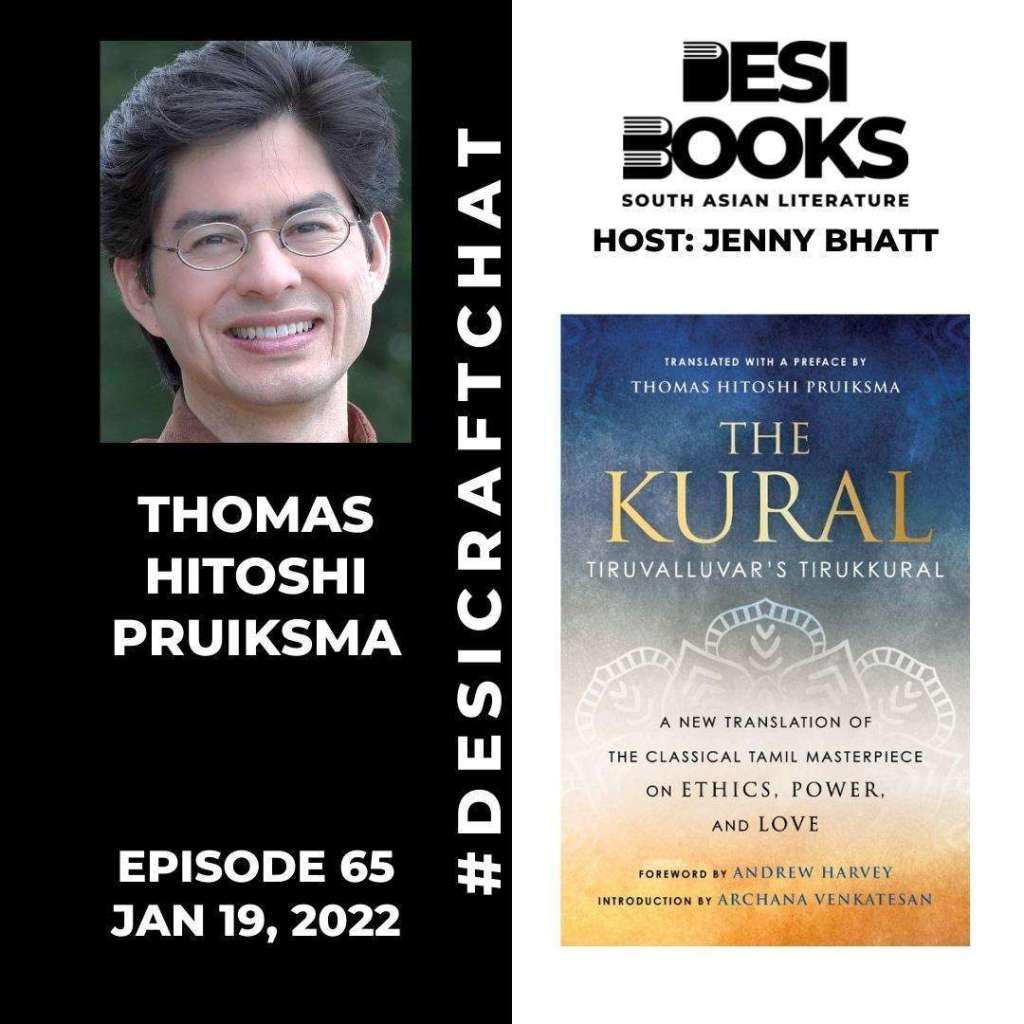

Desi Books Ep 65 w/ Thomas Hitoshi Pruiksma – Desi Books
(available at Anchor.fm, Spotify, Soundcloud, Apple Podcasts, Castbox, Google Podcasts, Stitcher, TuneIn, Breaker, Pocket Casts, RadioPublic, Overcast)
Hello and welcome to Episode 65 of Desi Books—news and views about desi literature from the world over. I’m your host, Jenny Bhatt. Thank you for tuning in.
In today’s #DesiCraftChat, we have Thomas Hitoshi Pruiksma discussing his latest, a literary translation of the Tamil classic, The Kural: Tiruvalluvar’s Tirukkural, into English. In this conversation, we talked about how literary translation can help bring languages and cultures closer, the inner journey of a literary translator—and much more.
#DESICRAFTCHAT WITH THOMAS HITOSHI PRUIKSMA — INTRODUCTION
Thomas Hitoshi Pruiksma is an author, translator, teacher, and performer. His translation of the classic Tamil masterpiece on ethics, power, and love, The Kural: Tiruvalluvar’s Tirukkural, was recently published by Beacon Press. Other books include The Safety of Edges (poems), Give, Eat, and Live: Poems of Avvaiyar (translated from the Tamil), and Body and Earth (with the artist C.F. John.) He speaks and performs widely, teaches for the Cozy Grammar series of online video courses, and has received grants and fellowships from the National Endowment for the Arts, 4Culture, Artist Trust, and the U. S. Fulbright Program.
The Kural is a new translation of Tirukkural, the classic Tamil masterpiece on ethics, power, and friendship, bringing Tiruvalluvar’s poetry and philosophy to a new generation seeking practical wisdom and spiritual sustenance. Drawing on the poetic tradition of W. S. Merwin, Wendell Berry, and William Carlos Williams, and nurtured by two decades of study under the Tamil scholar Dr. K. V. Ramakoti, this new translation of The Kural by Thomas Hitoshi Pruiksma brings English readers closer than ever to the brilliant inner and outer music of Tiruvalluvar’s work and ideas. The book is a masterwork of poetry and practical philosophy. On par with other world classics such as the Tao Te Ching, The Kural is a compendium of 1,330 short philosophical verses, or kurals, that together cover a wide range of personal and cosmic experience. Accompanying the translation is a foreword by the founder of the Institute for Sacred Activism, Andrew Harvey; an introduction by the translator and scholar Archana Venkatesan; and a “Commentary of Notes,” in which Pruiksma elucidates key words and shares insights from important Tamil commentaries. Rich with indelible wordplay, learning, and heart, Pruiksma’s translation transforms the barrier of language into a bridge, bringing the fullness of Tiruvalluvar’s poetic intensity to a new generation.
On a personal note, this was one of those books that completely upturned the expectations I had going in. The verses are timeless and beautiful. I can only imagine that, if they’re so lovely in English, they must be even more so in the original Tamil. More than a month after reading it, I still open pages at random almost daily just to revisit some of the philosophies and wisdom within. I know I will be giving this book as a gift to friends and family members for years to come.
Also, you can watch Thomas in conversation with Archana Venkatesan, who wrote an introduction for the translation, for the book’s launch at Elliot Bay Books here.
Here’s Thomas Hitoshi Pruiksma now.
#DESICRAFTCHAT WITH THOMAS HITOSHI PRUIKSMA
An excerpt from the interview:
Thomas Pruiksma: I never intended to become a translator. And, in fact, I was just writing something this morning about how when my Tamil teacher first started me in Tamil. He quite forcefully insisted that I not translate. He didn’t mean not to translate literary texts. He meant that as I was learning the Tamil language, he didn’t want me to be constantly translating between English and Tamil in my head. What he really wanted me to do was to use whatever English words I might need to enter into the understanding of a word or a phrase or a sentence, and then leave the English behind.
And so when I came to the point where I was able to read The Kural, I read it with my Tamil teacher during a Fulbright year in 2003-2004 as part of a larger project in which I was interested in how people relate to places, the relationship between people and land in literature as well as in daily speech. And so one of the literary works we studied was The Kural. And even then, I was primarily interested in entering the work as fully as I can. For instance, I learned how to compose in the same poetic form, the kural venba that Thiruvalluvar uses in his book. Not because I had any fantasy that I could become a great poet in Tamil, let alone in this particularly rigorous and concise form, but because it just gave me a way to enter into the Tamil and into the language and the poetics as fully as I can. But like I say, I had no intention, I didn’t even have the thought, at the time of translating the book.
And then, a couple years later, I was, you know, as I was, sort of . . . part of the fruit of this year of study, when I read along with The Kural, I also read some of the great and earliest Sangam love poems, and poems of ethics and poems of leadership. And I wanted to share these poems with people in English. And I realized that I couldn’t talk about these poems unless I translated them. And of course, there are translations available. In fact, there are some very good translations of some of the Sangam poetry but none of them seemed to capture the flavor or the feeling that I wanted to share with people that I was in conversation with. So that was the first step toward translating. And it was also . . . it has become a central part of my own practice as a writer because I realized, I learned through the practice of it, that translation is an extraordinarily potent and humbling and empowering way to apprentice yourself to the work of another writer. And I have since . . . I’ve translated work from both Spanish and from Tamil. And in all of those cases, it’s been very much a process of becoming a student of sitting at the feet of, so to speak, these great writers, these great poets, and learning from them, and with them, something about language, about the language in which they wrote as well as the language that I tend to write in.
You’ve been listening to episode 65 of Desi Books—news and views about desi literature from the world over. I’m your host, Jenny Bhatt. Thank you for tuning in.
Today’s #DesiCraftChat was with Thomas Hitoshi Pruiksma discussing his latest, a literary translation of the Tamil classic, The Kural: Tiruvalluvar’s Tirukkural, into English.
Episode 66 will be up shortly. Follow on Twitter @desibooks, Instagram @desi.books, Facebook @desibooksfb. Tag the accounts if you have requests or suggestions. Please go to the website if you’d like to sign up for the free, weekly newsletter. That’s desibooks.co. And please share this interview via social media so we can keep raising the tide of desi literature.
Stay healthy, keep reading, and write well.
NOTE: If you like the work being done at Desi Books, you can leave some appreciative feedback and sign up for the free, weekly newsletter. And please share this with other readers who might be interested. Remember: A Rising Tide Lifts All Boats.™
Join the Conversation
